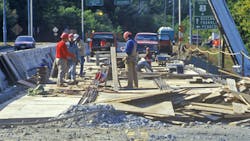The roughly $1 trillion public works bill would improve the nation’s roads, bridges, and ports is one step closer to reality. The Senate, in a 69-30 vote, approved the bipartisan package on Aug. 10. It still needs House approval before being sent to President Biden for his signature.
About half of the $1.2 trillion bill includes new spending. The money the Senate approved this week would fix roads and bridges ($110 billion), build out a nationwide electric vehicle charging infrastructure ($7.5 billion), improve ports and waterways ($16 billion), fund public transit ($49 billion), boost freight and passenger rail ($66 billion), improve airports ($25 billion), and boost broadband internet infrastructure ($65 billion).
This bill would be a top accomplishment for Biden, as no president this century has been able to get an infrastructure bill this significant through Congress. The $1 trillion package would topple the Obama Era American Recovery and Reinvestment Act, which totaled more than $800 billion but only spent about $48 billion on hard infrastructure.
What’s out: Parking, insurance hikes
Things left out of the Senate package include no increase to carriers’ minimum insurance liability, which stands at $750,000. It also does not create new independent contractor rules, such as California’s AB-5, which could change how owner-operators work within the trucking industry. These were two potential provisions that concerned some trucking industry leaders.
Another item left out of the package is any mention of improving or studying the truck parking shortage across the U.S., which disappointed Todd Spencer, president and CEO of the Owner-Operators Independent Drivers Association, which represents more than 150,000 drivers.
“Given how critical drivers are to our nation’s supply chain, it is extremely frustrating to see lawmakers continue to treat truckers as an afterthought,” Spencer said in response to truck parking not being part of the infrastructure bill. He then thanked Senators Mark Kelly (D-Arizona) and Cynthia Lummis (R-Wyoming), who attempted to add an amendment that would have spent about $1 billion toward truck parking.
Spencer said that the OOIDA would continue to work with legislators such as Kelly and Lumis “to identify other opportunities to address the lack of parking.”
He said that the parking issue “should have been a bipartisan slam dunk. Instead, the continued lack of action has demonstrated to America’s truckers that, despite all their hard work keeping the country safe and supplied throughout the COVID-19 pandemic, they largely remain an afterthought in the Senate. The lack of dedicated funding to address the truck parking crisis is a major reason OOIDA could not support the bill.”
What’s in: Roads, safety systems, driver recruitment
The American Trucking Associations, however, did back the bill. “For nearly three decades, our nation and industry have been held hostage by empty promises—all talk, no action,” Chris Spear, the ATA president and CEO, said on Aug. 10. “Today, the Senate put America ahead of itself.”
Spear called the Senate’s bill “a groundbreaking step toward revitalizing America’s decaying roads and bridges, supporting our supply chain and economy with the foundation they need to grow, compete globally, and lead the world. The bill also contains significant measures to grow and strengthen trucking’s essential workforce.”
There is a lot to do with trucking among the 2,700-page bill passed by the Senate this week: a mandate for automatic emergency braking (AEB) systems on commercial vehicles, trailer and truck underride guard studies, driver workforce outreach programs, promoting women to work in the trucking industry, and a study of truck leasing, among other items. (Details of which FleetOwner reported on last week.)
While lamenting that the Highway Trust Fund was not made self-sustainable by the infrastructure bill, David Heller, the Truckload Carriers Association vice president of governmental affairs, told FleetOwner last week, “this is probably the biggest step forward we've made since the fuel tax was last increased in 1993. There's no doubt about that. We need to fix our nation's bridges and roadways.”
About the Author
Josh Fisher
Editor-in-Chief
Editor-in-Chief Josh Fisher has been with FleetOwner since 2017. He covers everything from modern fleet management to operational efficiency, artificial intelligence, autonomous trucking, alternative fuels and powertrains, regulations, and emerging transportation technology. Based in Maryland, he writes the Lane Shift Ahead column about the changing North American transportation landscape.

